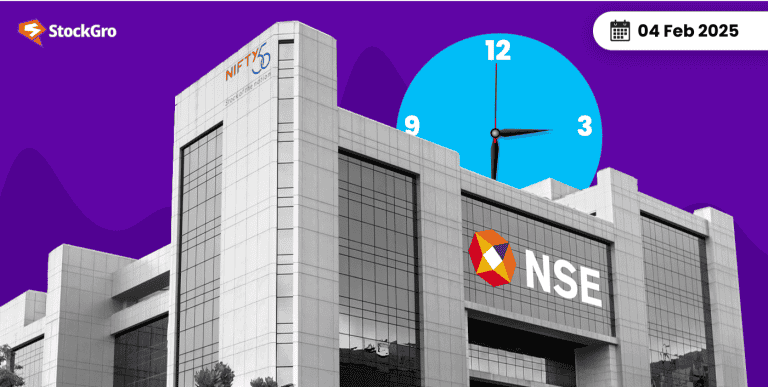
The 2025 budget introduced a host of economic reforms that include tax reforms and capital spending for some major sectors. Market participants viewed these reforms as beneficial for some sectors, whereas they believe that some sectors might not benefit as much from the budget.
This article provides insights into sectors that have declined or are trading flat after the 2025 Union budget.
Energy, Power and Infrastructure
| Index | % Return (on 3rd Feb 2025) |
| Nifty Energy Index | -2.83% |
| Nifty Infrastructure Index | -1.67% |
| Nifty Oil & Gas Index | -2.01% |
Source: NSE
The reasons for the sell-off in the Nifty Energy, Infrastructure and Oil & Gas Index are:
- The 2025 budget had a provision of spending ₹11.2 trillion as capital expenditure for FY26. Although this is a substantial amount of money, it was below the expectations of market participants and various industry bodies. Market participants believe that this amount is not enough to push targeted growth in India.
- In FY25, the government fell short of its estimated spending target of ₹11.1 trillion and spent ₹10.8 trillion. This has raised concerns among investors about the government’s commitment to capital expenditure in various sectors.
- Additionally, investors believe that the tax cut provided by the government will hamper revenue collection in the future. Although this move will increase the disposable income of the public, it might lead to lower revenue for the government and, hence, lower spending.
- The LPG subsidies being provided by the government have raised concerns for oil marketing companies. As they will be unable to pass on the increased cost to the customers.
The government introduced many positive reforms for boosting infrastructure, such as 50-year tax-free loans to state governments, ₹20,000 crores for nuclear energy, etc. However, these reforms fell short of market expectations. Markets were expecting higher capital expenditure than provided.
Also read: The renewable energy industry in India: A game-changer for the environment
Pharmaceutical Sector
| Index | % Return (on 3rd Feb 2025) |
| Nifty Pharmaceutical Sector | +0.21% |
| Nifty Healthcare Sector | +0.31% |
Source: NSE
The pharmaceutical sector was flat post-budget despite an allocation of ₹98,311 crores. Measures like tax relief will increase public spending on healthcare, but there are no clear guidelines or plans regarding capital expenditure for the pharmaceutical sector.
The tariffs being imposed by the United States government also impose uncertainty for this sector. Since many Indian pharmaceutical players cater to the American market.
Metal Sector
| Index | % Return (on 3rd Feb 2025) |
| Nifty Metal Index | -1.71% |
| Nifty Commodities Index | -1.41% |
Source: NSE
Metal and Mining shares saw declines after the budget. The budget introduced the lowering of customs duties on imports of some key raw materials, which will lower the cost of production for metal companies. But the metal industry was looking for increased capex.
The absence of any Production Linked Incentive (PLI) schemes and lower-than-expected capital expenditure led investors to believe that the profitability of metal companies could shrink in the short term.
The metal industry is one of the key industries to be affected by the US tariffs. Uncertainty around tariffs is also one of the key factors of sell-off in metal shares in the short term. The government’s focus on long-term infrastructure growth and shipbuilding can be beneficial for the metal industry, but its impact will become evident in the long run.
Banking and Financial Services
| Index | % Return (on 3rd Feb 2025) |
| Nifty Bank Index | -0.56% |
| Nifty Financial Services Index | -0,12% |
| Nifty PSU Bank index | -1.59% |
| Nifty Private Bank Index | -0.62% |
Source: NSE
The government revised its FY25 fiscal deficit target to 4.8%. The total borrowing to overcome the fiscal deficit increased from ₹14.01 trillion to ₹14.82 trillion. This means that the government will have to issue a higher amount of government bonds to overcome this deficit.
This can be troublesome for the banks because issuing larger amounts of bonds can push the yields higher. This can be troublesome for the banks. Moreover, there are no clear measures to boost the banking sector in the budget. These are some of the reasons why banking stocks are witnessing a sell-off.
Measures such as tax reliefs can boost the amount of money people deposit with the banks. This can be beneficial for the banks in the long run.
Also read: What is a budget deficit?
Defence sector
| Index | % Return (on 3rd Feb 2025) |
| Nifty Defence Index | -5.14% |
Source: NSE
The defence sector is allocated ₹6.81 lakh crore in the FY26 budget, an increase of 9.53% from the previous year. But 23.49% of this budget goes towards pensions for retired soldiers.
Out of all the defence sector allocations, only ₹1.8 lakh crores are directed towards capital expenditure. This expenditure will be spent on adding new military equipment. However, the industry stakeholder finds this amount insufficient to boost the defence sector.
The Ministry of Defence returned ₹12,500 crores allocated in the 2024 interim budget, raising concerns among investors about the underutilization of the allocated capital.
Also read: Risk management in stock market
Bottomline
The market participants found the income tax reliefs in the budget very helpful for increasing disposable income in the hands of the public. But, they were unsatisfied with the capital allocation in various sectors evidenced by the price movement of stocks. Analysts believe that there should have been increased capex in the 2025 budget if the government wants to meet its targets of growth.

